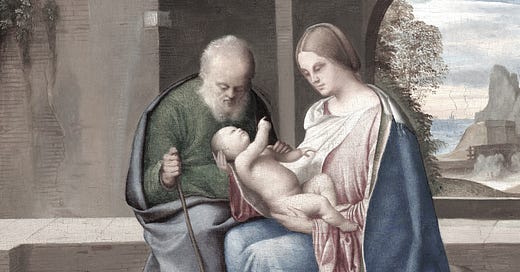Why Celebrate Christmas?
The One who sacrificed Himself in our place is not a debt collector or an accuser, but a savior. He demands nothing and only gives.
There is only one reason to celebrate Christmas. However, this reason is so widely ignored that Christmas parties are probably considered a superstition in the strict sense, or ritualistic repetitions of meaningless formality, and that, therefore, everyone is free to project whatever silly fantasies they choose.
Jesus Christ, the incarnation of the Divine Word, or God's intelligence, came into the world to offer Himself as the singular and definitive sacrificial victim. This act ended the historical cycle that had been present since humanity's beginning, a cycle that was addressed by the Doctrine of Sacrifice1.
The Doctrine of Sacrifice is inherent in the structure of cosmic existence. Only God has the plenitude of being. Everything else that exists, that is not God, has a precarious existence, built upon an incurable ontological debt. This debt manifests as guilt at the level of the human soul.
The Doctrine of Sacrifice has never been and could ever be suspended.
What our Lord Jesus Christ did was to completely fulfill it all at once. In its place, He instituted the Eucharist, which is a record of the definitive sacrificial act. The record then replaces the unnecessary sacrifice of new victims.
Previously, the victims were added: 1 + 1 + 1 + 1…
Now, the single victim multiplies itself in the act of the Eucharist: 1 x 1 x 1 x 1…
Just do the math, and you will understand why Christmas should be celebrated.
The problem is that the end of a historical cycle doesn't necessarily make the following generations aware of the change that has occurred.
This awareness should be retaken and passed down from generation to generation. However, in modern society, it has been some time since this passing of the torch has ceased. Very few people have a clear understanding of what Christmas has given them. The majority when receive presents does not know that these only symbolize a much greater gift that was given over two thousand years ago.
This gift can be described in a few words:
Every person, by the simple fact that they exist, is tormented by guilt, and lives with a constant internal discussion of accusation and defense, which produces fear, hate, envy, jealousy, and an obsessive search for approval. These feelings make people vulnerable to vile words, accusations, and insinuations, whether they come from loved ones, society, surrounding culture, or from within themselves.The accumulation of these accusations and insinuations is the demonic spirit which, powered by guilt, holds immense sway over human beings. To shield themselves from it, people often submit to the very sources of their pain, believing that those who can harm them can also help them. Consequently, they become sacrificial victims, or scapegoats, in a grotesque simulated ritual.
Christ warns us that this sacrifice is useless, unnecessary, and sinful. No power or authority in the world can demand victims. God the Father demanded only one sacrifice, which He provided Himself. Henceforth, if anyone feels guilty, they should not offer themselves as sacrificial victims before any altar. Instead, they should remember Christ’s sacrifice and be joyful. That is all.
Many people are aware of this, but they only understand it from the religious point of view—failing to comprehend the practical implications of psychological order, which are ominous:
The One who sacrificed Himself in our place is not a debt collector or an accuser, but a savior. He demands nothing, only gives. In return, He accepts a small word, a smile, an unexpressed intention, anything. That is because he is not fretful or proud: He is gentle and humble.
If you are still vulnerable to accusatory looks and poisonous words, if you still feel any fearful reverence before the schemers and the wicked in fear of shame or punishment, it means you have yet to understand the meaning of Christmas.
This meaning is simple and direct: The wicked and the schemers no longer have any authority over you. Do not bow before them, do not let your weaknesses be exploited by the wickedness of this world.
Jesus Christ has already paid your debt.
That is why we celebrate Christmas.
Olavo de Carvalho, December 25, 2003. Translated by Pedro Carvalho and edited by The Academy.

See La Doctrine du Sacrifice, by Ananda Coomaraswamy; and The Scapegoat, by René Girard.





I must tell you that as a Reformed Protestant I both love and appreciate this. Merry Christmas!